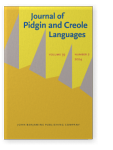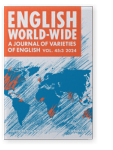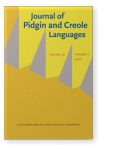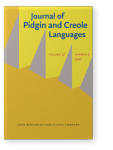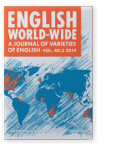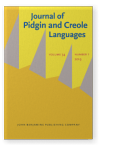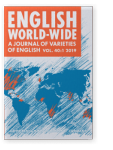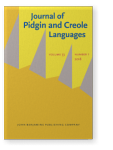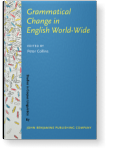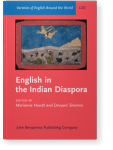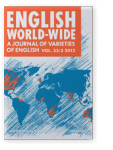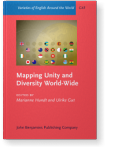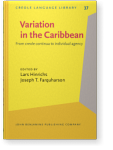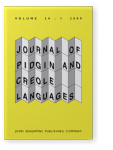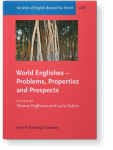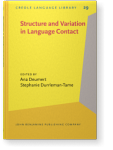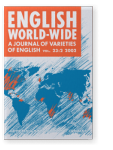Dagmar Deuber
List of John Benjamins publications for which Dagmar Deuber plays a role.
Journal
2024 Code-switching in South Asian English CMC English World-Wide 45:3, pp. 311–341 | Article
This paper analyses the use of indigenous language elements including code-switching in two contrasting genres, i.e. group chats and Twitter memes along with tweets, in the English communication of South Asian (Bangladeshi, Indian, Pakistani, and Sri Lankan) internet users. The results from… read more
2022 Context matters: Grenadian students’ attitudes toward newscasters’ and teachers’ accents Journal of Pidgin and Creole Languages 37:1, pp. 16–52 | Article
This paper presents the results of two largely parallel verbal guise studies that elicited students’ attitudes toward different standard varieties of English. The studies were conducted in the small anglophone Caribbean island country of Grenada. The two studies were contextualized in the… read more
2022 Phonetic variation in Standard English spoken by Trinidadian professionals Journal of Pidgin and Creole Languages 37:2, pp. 357–394 | Article
This paper analyzes the speech of 27 Trinidadian professionals (lawyers, lecturers, and politicians), who are typical speakers of Standard Trinidadian English in formal contexts, where traditionally Standard English is targeted. We investigate phonetic variation in Trinidadian English speech… read more
2019 The interplay of the national, regional, and global in standards of English: A recognition survey of newscaster accents in the Caribbean English World-Wide 40:3, pp. 241–268 | Article
An accent recognition survey was designed and distributed among respondents from the anglophone Caribbean with the aim of finding out whether they can recognize different standard accents of English as spoken by newscasters from five Caribbean countries, namely Jamaica, St Kitts and Nevis,… read more
2019 Trinidadian secondary school students’ attitudes toward accents of Standard English Journal of Pidgin and Creole Languages 34:1, pp. 83–125 | Article
In the anglophone Caribbean, tendencies of endonormative reorientation have been observed in the development of local standards of English. Situated in the school context, this study adds a language attitude perspective on the question of whether and to what extent an endonormative standard of… read more
2019 A Multidimensional Analysis of Pakistani and U.S. English blogs and columns English World-Wide 40:1, pp. 1–24 | Article
The present study is a Multidimensional Analysis (MDA) of English blogs and newspaper columns originating from Pakistan and the U.S. using MDA dimensions reported in Grieve et al. (2010): (i) Informational versus Personal Focus; (ii) Addressee Focus; (iii) Thematic Variation; and (iv) Narrative… read more
2018 Singaporean internet chit chat compared to informal spoken language : Linguistic variation and indexicality in a language contact situation Journal of Pidgin and Creole Languages 33:1, pp. 48–91 | Article
This paper compares data from a Singaporean chit chat forum to informal spoken data. We first perform a qualitative analysis of text samples in a framework of indexicality. Then we present quantitative findings for two (sets of) features each of the contact variety Singlish (particles, the… read more
2015 American influence on written Caribbean English: A diachronic analysis of newspaper reportage in the Bahamas and in Trinidad and Tobago Grammatical Change in English World-Wide, Collins, Peter (ed.), pp. 389–410 | Article
This paper presents a diachronic analysis of press news reports in the Bahamas and in Trinidad and Tobago with a view to shedding light on the question of Americanisation. We analyse four corpora, one from the 1960s and one contemporary from each country. The following features are studied: (1)… read more
2014 Indo-Trinidadian speech: An investigation into a popular stereotype surrounding pitch English in the Indian Diaspora, Hundt, Marianne and Devyani Sharma (eds.), pp. 9–27 | Article
This paper examines the extent to which fundamental frequency (F0) contributes to the stereotype that Indo-Trinidadians have a distinctive way of speaking, namely that they have high-pitched voices in contrast to Afro-Trinidadians, who are perceived as having voices with a low tone. We report the… read more
2012 Review of Adeyanju (2009): English World-Wide 33:2, pp. 231–235 | Review
2012 Will and would in selected New Englishes: General and variety-specific tendencies Mapping Unity and Diversity World-Wide: Corpus-Based Studies of New Englishes, Hundt, Marianne and Ulrike Gut (eds.), pp. 77–102 | Article
This paper presents a quantitative and qualitative investigation of the use of the modal verbs will and would in six New Englishes (Fiji, Indian, Singapore, Trinidadian, Jamaican and Bahamian English), with British English considered for comparison; will/would in their future use are also compared… read more
2011 The creole continuum and individual agency: Approaches to stylistic variation in Jamaica Variation in the Caribbean: From creole continua to individual agency, Hinrichs, Lars and Joseph T. Farquharson (eds.), pp. 133–162 | Article
This paper analyses creolisms in a set of conversations among educated Jamaicans. It focuses on morphology and syntax but lexis is also considered. Two different approaches are applied: a quantitative approach in the framework of the creole continuum and a qualitative, interaction-based approach.… read more
2009 ‘The English we speaking’: Morphological and syntactic variation in educated Jamaican speech Journal of Pidgin and Creole Languages 24:1, pp. 1–52 | Article
This paper describes morphological and syntactic variation in a sample of forty conversations among highly educated Jamaicans taken from the Jamaican component of the International Corpus of English. The guiding question is whether the creole continuum model can account for the way speakers like… read more
2009 Standard English in the secondary school in Trinidad: Problems — properties — prospects World Englishes – Problems, Properties and Prospects: Selected papers from the 13th IAWE conference, Hoffmann, Thomas and Lucia Siebers (eds.), pp. 83–104 | Article
Based on recordings of classroom speech and conversational interviews with teachers, this paper analyses language use and attitudes in Trinidadian secondary schools. Whereas students often speak Trinidadian Creole in class, teachers generally differentiate, with English being used for formal… read more
2006 Aspects of variation in educated Nigerian Pidgin: Verbal structures Structure and Variation in Language Contact, Deumert, Ana and Stephanie Durrleman (eds.), pp. 243–261 | Chapter
This paper presents quantitative analyses of variation in selected areas of the grammar of Nigerian Pidgin as spoken by educated speakers (who also have a good command of English, the lexifier): tense/aspect marking, copula forms and verbal negation. The background is the theory going back to work… read more
2002 First year of nations return to government of make you talk your own make I talk my own: Anglicism versus pidginization in news translations into Nigerian Pidgin English World-Wide 23:2, pp. 195–222 | Article
As a language which for the greater part of its history was used only for simple everyday interactions and which lacks any kind of standardization, Nigerian Pidgin (NigP) is not well equipped for the wide range of functions it has to perform in present-day Nigeria. Among educated NigP speakers,… read more
Conventionalization and variation in computer-mediated communication: New perspectives on Nigerian Pidgin spelling English World-Wide: Online-First Articles | Article
This paper investigates spelling practices in Nigerian Pidgin (NigP) computer-mediated communication (CMC) as well as Nigerians’ perceptions of these. The first part is a corpus-based analysis. It shows that conventionalization of spelling variants is taking place in the absence of formal… read more
